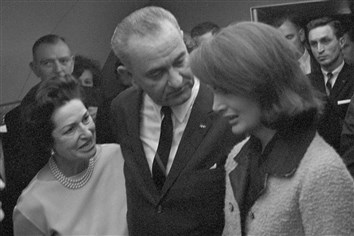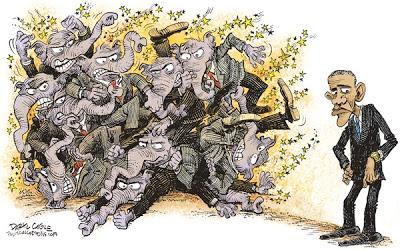Saturday, November 30, 2013
Thursday, November 28, 2013
LINCOLN'S THANKSGIVING PROCLAMATION
Abraham
Lincoln was the 16th President of the United States and steered this country
through the Civil War. His face graces Mount Rushmore along with Washington,
Jefferson, and Theodore Roosevelt. The Lincoln Memorial was built in his
memory.
150
years ago Lincoln issued a proclamation declaring the last Thursday in November
a day of Thanksgiving. Text provided here
and below the break.
Wednesday, November 27, 2013
PRESIDENT JOHNSON'S ADDRESS (27 November 1963)
Over
the summer I made a stop at the LBJ Presidential Library & Museum in Austin
on my way back from the Young Democrats of America Conference that was held in San
Antonio. I last visited the museum when I was a kid with my grandparents and
the thing I remember about the exhibits was the replica of the Oval Office.
This
time the trip was a little more in depth. I noticed documents and exhibits that
resonate to this day. There was the poll tax receipt, campaign paraphernalia, a
copy of the Civil Rights Act of 1964, items associated with the Voting Rights
Act of 1965, and the first Medicaid card which was issued to former President
Harry S. Truman.
One
of the documents that caught my eye was President Johnson's meeting
with the cabinet after the assassination.
The
stable transition of our government was important. George Washington could have
ran for a third term in 1796,
but felt that two terms was enough thus establishing a precedent that was
followed until Franklin Roosevelt. The peaceful transition from one political
party to another was established when John Adams abided by the election results
of 1800
and ceded control to Thomas Jefferson whom he often clashed with.
After
William Henry Harrison died in 30 days, John Tyler became president thus
establishing the precedent of when the president dies the vice-president takes
over. This was faced with its
own controversy (scroll down, it's there) as people addressed Tyler as "His
Accidency" or "The Acting President" or even by his previous
office, "Mr. Vice-President."
The
practice was repeated after the assassinations of Lincoln, Garfield, and McKinley,
and the deaths of Harding in 1923 and Franklin Roosevelt in 1945. The deaths of
Lincoln and Roosevelt happened during periods of uncertainty. Lincoln's
assassination occurred days after the South surrendered in the Civil War and
Roosevelt's death happened in the waning days of World War II.
Kennedy's
assassination occurred when the Cold War was still fairly warm. The Cuban
Missile crisis happened a year earlier and there were still many more
storylines yet to be written in this time period. It was important that the
functions of our government continued. Yes, it was OK to be sad and mourn as
President Johnson released funeral
plans, issued a proclamation,
and Executive Order
11128 announcing the following Monday as a day of remembrance to their
slain leader to allow the country to grieve and express their sorrow. But the
meeting with the
cabinet and that document was equally as important to show our resolve that
the work of the government will continue.
On
27 November 1963, President Lyndon Johnson addressed a joint session of
Congress along with a still grieving nation regarding the assassination of
President John F. Kennedy and how the nation will move forward.
President
Johnson began his address with these words:
Mr. Speaker, Mr. President, Members of
the House, Members of the Senate, my fellow Americans:
All I have I would have given gladly
not to be standing here today.
The greatest leader of our time has
been struck down by the foulest deed of our time. Today John Fitzgerald Kennedy
lives on in the immortal words and works that he left behind. He lives on in
the mind and memories of mankind. He lives on in the hearts of his countrymen.
No words are sad enough to express our
sense of loss. No words are strong enough to express our determination to
continue the forward thrust of America that he began.
Video
is provided after the break and text provided from The
American Presidency Project.
Monday, November 25, 2013
Saturday, November 23, 2013
Thursday, November 21, 2013
Tuesday, November 19, 2013
Thursday, November 14, 2013
Monday, November 11, 2013
Saturday, November 9, 2013
Friday, November 8, 2013
JOHN LEWIS "MARCH"
In
this interview, Civil Rights icon and Representative John Lewis (D, GA-5)
flanked by graphic novel artists Andrew Aydin and Nate Powell about the project
chronicling the Congressman's involvement in the Civil Rights Era.
I
own a couple of graphic novels that revolve around historical events. On my bookshelf
is The 9/11 Report: A Graphic Adaptation
and 08: A Graphic Diary of the Campaign
Trail. This is a different way of presenting historical events that have
taken place.
This
is the first of three books and is definitely on my must buy list.
Thursday, November 7, 2013
Monday, November 4, 2013
Sunday, November 3, 2013
CONGRESS NEEDS TO PASS THE EMPLOYMENT NON-DISCRIMINATION ACT (President Barack Obama)
Barack
Obama is the 44th President of the United States. He was elected with over 50%
of the popular vote in 2008
and 2012 becoming the
first Democrat to do so since Franklin Delano Roosevelt. President Obama started
his political career as an Illinois State Senator being elected to that
position in 1996. In 2004 he
gave a keynote address to the Democratic National Convention that skyrocketed
him to national prominence which was followed by his election to the US Senate that November.
Prior to entering politics, he was president of the Harvard Law Review. He graduated with a bachelor of arts from Columbia University and a Juris Doctor from Harvard Law.
Prior to entering politics, he was president of the Harvard Law Review. He graduated with a bachelor of arts from Columbia University and a Juris Doctor from Harvard Law.
He
was born in Honolulu, HI on 4 August 1961 to a woman from Kansas and man from
Kenya. His wife, Chicago lawyer Michelle Robinson, and him were married in October
1992. They have two daughters, Malia and Sasha. President Obama and his family
currently reside at 1600 Pennsylvania Avenue NW in Washington, DC which where
they will reside there until 20 January 2017.
 President
Obama's record
on LGBT issues speaks for itself as he has stood for the people that I hold
near and dear to my heart. In 2009 the White House held its first ever LGBT
Pride event recognizing the events that took place at the Stonewall Inn in June
1969. He signed the Matthew Shepard and James Byrd, Jr. Hate Crimes Prevention
Act to include attacks based on the victim’s actual or perceived sexual
orientation or gender identity. President Obama directed the Department of
Health and Human Services to allow visitation rights for LGBT patients. Beginning
next year, insurance companies cannot deny LGBT Americans health care coverage.
President
Obama's record
on LGBT issues speaks for itself as he has stood for the people that I hold
near and dear to my heart. In 2009 the White House held its first ever LGBT
Pride event recognizing the events that took place at the Stonewall Inn in June
1969. He signed the Matthew Shepard and James Byrd, Jr. Hate Crimes Prevention
Act to include attacks based on the victim’s actual or perceived sexual
orientation or gender identity. President Obama directed the Department of
Health and Human Services to allow visitation rights for LGBT patients. Beginning
next year, insurance companies cannot deny LGBT Americans health care coverage.
In
an interview with ABC's Robin Roberts last year, President Obama stated his
support for marriage equality becoming the first sitting president to do so.
Recently, President Obama reaffirmed this nation's commitment to LGBT rights on
a global scale when he stated this in an interview with Jay Leno on The Tonight Show:
And
he signed the "Don't
Ask, Don't Tell" Repeal Act of 2010 that allowed gay, lesbian, and
bisexual persons to serve openly in the military.
President Obama in this op-ed is urging Congress to take up the Employee Non-Discrimination Act (ENDA). This legislation would ensure LGBT Americans, especially the ones who are T like my fellow football prognosticator, Ms. Monica Roberts, are ensured workplace protections. I know many transgender persons through my connections in politics, and I know a couple of transgender veterans.
In
April 2013, I attended the Texas Stonewall Democrats conference in Austin.
While there a gentleman who works for a well known Democratic legislator in The
Lege stated that after he transitioned he lost his rights.
Simply
put: folks should not lose job security because they happen to be who they are.
Saturday, November 2, 2013
Subscribe to:
Comments (Atom)
















